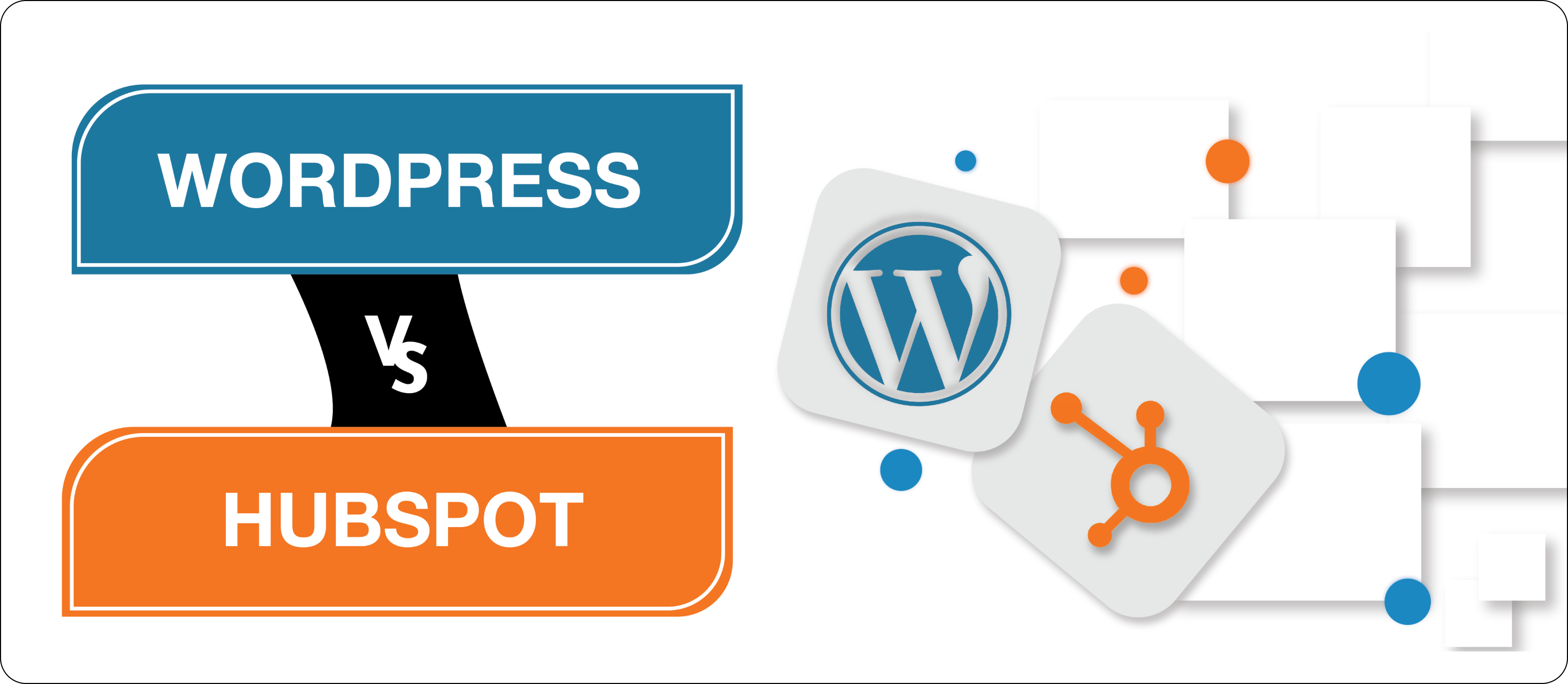Step into the arena of website platforms as we dissect the showdown between WordPress vs HubSpot. Delve deep into their features, from SEO capabilities and design flexibility to integration options and support. By the end, you’ll uncover the ultimate champion for your website needs.
WordPress vs HubSpot: Unraveling the Best Platform for Your SEO Strategy

Dive into the intricate comparison between WordPress and HubSpot, two heavy weight contenders in the realm of website platforms, specifically focusing on their impact on your SEO strategy. Explore the nuances of each platform’s SEO capabilities, dissecting factors such as metadata optimization, URL structure, sitemap generation, and plugin/add-on options.
Uncover insights into how each platform supports your efforts to climb search engine rankings and drive organic traffic. By the end, you’ll understand which platform offers the best toolkit to supercharge your SEO strategy and propel your online presence to new heights.
Round 1. Access to Information

WordPress
- WordPress offers complete control and ownership over website data as an open-source platform.
- Users can customize, export, and migrate content freely.
- A diverse range of analytics plugins is available.
- Extensive community support.
HubSpot
- Hubspot Provides centralized access to data through its integrated platform.
- Subscription tiers may restrict advanced analytics.
- Dedicated support for effective data utilization.
Winner: WordPress
WordPress wins with its open-source nature, providing unparalleled control and flexibility in data management.
Round 2. Data Analysis

WordPress
- To analyze website data, leverage various analytics plugins such as Google Analytics Integration, Jetpack Stats, and MonsterInsights.
- Customizable tracking options enable users to delve into metrics like traffic sources, user behavior, and content performance.
- The open-source nature of WordPress facilitates the implementation of advanced data analysis techniques and integrations.
- The WordPress community is a valuable resource for guidance and support in practical data analysis and interpretation.
HubSpot
- Incorporates built-in data analysis tools within its integrated marketing platform, providing insights into website performance, lead generation, and marketing campaigns.
- Centralized data analysis allows for comprehensive reporting and monitoring of critical metrics across multiple channels.
- Automation features streamline data analysis processes, empowering users to generate custom reports, track conversions, and optimize marketing efforts.
- Dedicated support assists users in harnessing data effectively for informed decision-making and campaign optimization.
Winner: HubSpot
HubSpot clinches the victory in data analysis thanks to its integrated platform and robust tools that streamline processes and offer automation features for comprehensive reporting and optimization.
While WordPress offers flexibility through plugins, HubSpot’s centralized approach and dedicated support make it the preferred choice for users seeking advanced analytics capabilities.
Round 3. Blog Administration

WordPress
- WordPress boasts a user-friendly interface for managing blog content and facilitating effortless post creation, editing, and publishing.
- Users can personalize their blog's look and functionality with various themes and plugins, ensuring a unique and tailored experience.
- Key features such as categorization, tagging, and scheduling empower users to organize and optimize their blog content efficiently.
- The extensive WordPress community is a valuable resource, offering support and guidance for effective blog administration.
HubSpot
- HubSpot's integrated platform provides robust tools for blog administration, offering seamless post creation, editing, and publishing functionalities.
- Users can leverage customizable templates and design tools to craft visually appealing and brand-consistent blog posts effortlessly.
- Built-in features like content scheduling, social sharing, and SEO optimization streamline the management and promotion of blog content.
- HubSpot's analytics and reporting capabilities offer valuable insights into blog performance, enabling users to refine their content strategy for maximum impact.
Winner: HubSpot
HubSpot emerges as the winner in blog administration, offering a comprehensive platform with seamless tools, customizable templates, and insightful analytics for effective content management and optimization.
While WordPress provides flexibility through its extensive ecosystem, HubSpot’s integrated approach and built-in features make it the preferred choice for users seeking efficient and streamlined blog administration solutions.
Round 4. Flexibility
WordPress
- WordPress offers unparalleled flexibility due to its open-source nature, allowing users to customize virtually every aspect of their websites.
- Users have access to a vast ecosystem of themes and plugins, providing endless possibilities for customization and functionality.
- With the ability to modify code and develop custom solutions, WordPress is highly adaptable to different needs and requirements.
HubSpot
- While providing some flexibility, HubSpot may be more limited than WordPress, particularly regarding website customization.
- Users can customize their HubSpot websites using templates, themes, and built-in tools, but these options may not offer the same versatility as WordPress.
- HubSpot's focus on inbound marketing and lead generation may make it less suitable for websites requiring more specialized functionality.
Winner: WordPress
WordPress is the winner in flexibility, thanks to its open-source architecture and extensive library of themes and plugins. It allows users to customize their websites according to their unique requirements.
While HubSpot offers some flexibility, particularly within its integrated marketing platform, it may have more limitations than WordPress.
Round 5. Safety
Winner: HubSpot
HubSpot is the winner in safety due to its dedicated focus on security, robust measures to protect user data and built-in security features. These make it the preferred choice for users concerned about safety and platform integrity.
Round 6. Site Development

Winner: WordPress
WordPress wins in site development due to its unparalleled flexibility, customization options, and extensive ecosystem of themes and plugins, providing users with complete control over their website’s design and functionality.
Round 7. Website Optimization
| Criteria | WordPress | HubSpot |
|---|---|---|
| Offers a wide array of SEO plugins and tools. | Provides built-in SEO optimization features. | |
| Highly customizable with an extensive plugin ecosystem. | Templates and tools for customization. | |
| Requires some technical knowledge for optimization. | Intuitive interface for users with varying skill levels. | |
| Extensive community support and resources available. | Dedicated support and guidance for optimization. |
Winner: Tie
WordPress offers extensive customization and a vast plugin ecosystem for optimization but requires technical knowledge. On the other hand, HubSpot provides built-in tools and intuitive interfaces, making it easier for users but less flexible than WordPress. Ultimately, the choice depends on the user’s preference for customization and ease of use.
Round 8. Website Design and Aesthetics
| Criteria | WordPress | HubSpot |
|---|---|---|
| Extensive selection of themes and plugins for customization. | Templates and design tools for easy customization. | |
| Highly flexible with the ability to modify code and CSS. | Limited flexibility compared to WordPress. | |
| Can achieve visually stunning designs with the right theme. | Templates may limit uniqueness but ensure consistency. | |
| It may require some technical knowledge for advanced changes. | Intuitive interface suitable for users with varying skills. |
Winner: WordPress
WordPress wins in website design and aesthetics due to its extensive customization options, flexibility, and potential for visually stunning designs. While HubSpot offers user-friendly templates, WordPress provides greater freedom for advanced customization and achieving unique visual appeal.
In the digital arena, where innovation is king and strategy reigns supreme, WordPress and HubSpot emerge as stalwart champions. With WordPress offering boundless customization and HubSpot providing streamlined marketing integration, businesses navigate a dynamic landscape of possibilities. In this ever-evolving digital realm, choosing between these titans isn’t just about platforms—it’s about forging a path toward online excellence.
